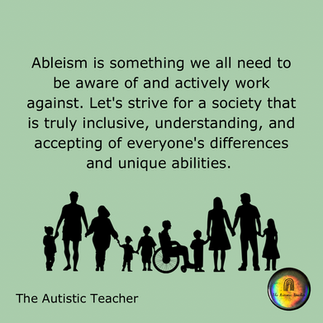
Understanding Ableism: An insight by The Autistic Teacher
- mandycook2021
- Nov 19, 2023
- 2 min read
Ableism is a term that has been widely discussed but often misunderstood. The Autistic Teacher, an advocate for neurodivergent individuals, provides a thought-provoking perspective on ableism, what it entails, and how it affects the lives of those with disabilities.
Defining Ableism
Ableism is a form of discrimination or prejudice that originates from a belief that a specific way of living or being is essential for a fulfilling life. It often manifests as an assumption that those with disabilities are less capable or less valuable simply because they have different ways of doing things.
Like other forms of discrimination such as racism and homophobia, ableism involves a group of people projecting an image of what they believe society should ideally look like. Anything that deviates from this norm is often rejected as wrong, inferior, or broken. This bias is used to marginalize and exclude others who do things differently.
The Harm of Casual Ableism
One of the common statements that perpetuate ableism is "No one means any harm by it. It's just a joke!" Such a remark, however casual it might seem, can contribute to the stigmatisation and dehumanisation of minority groups and disabled individuals. The Autistic Teacher emphasises that words matter and using humour to justify the ridicule of disabilities and differences is inexcusable.
The Cost of Accessibility
Another misconception that bolsters ableism is that "Accessibility is just too costly and inconvenient." However, true accessibility is beneficial to everyone, not just those with disabilities. Many adaptations intended for neurodivergent individuals are relatively low-cost, yet they can significantly improve the quality of life for the individual. Regardless of its cost or inconvenience, accessibility is a crucial aspect of creating a more inclusive society.
Equality vs Equity
Many people believe that treating everyone the same is the solution. However, the statement "I don't see disabilities, I treat everyone the same" can sometimes invalidate the experiences and needs of people with disabilities. While the intention is commendable, it is essential to recognise and acknowledge someone's disability or challenges when necessary. Understanding and respecting differences and their impact is a step towards true inclusivity.
A Call to Action Against Ableism
Ableism is something that everyone needs to be aware of and actively work against. I would encourage everyone to strive for a society that is genuinely inclusive, understanding, and accepting of everyone's differences and unique abilities.





















Comments